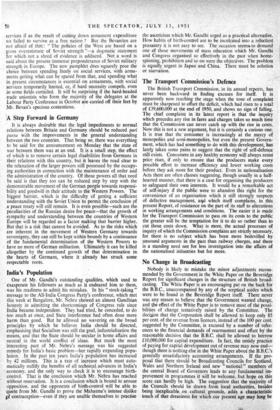India's Population
One of Mr. Gandhi's outstanding qualities, which used to exasperate his followers as much as it endeared him to them, Was his readiness to admit his mistakes. In his " stock-taking " message to the All-India Congress Party's conference, which met this week at Bangalore, Mr. Nehru showed an almost Gandhian honesty in admitting the shortcomings of Congress rule since India became independent. They had tried, he conceded, to do too much at once, and State interference bad often done more harm than good. But he allowed no wavering on the broad principles by which he believes India should be directed, emphasising that Socialism was still the goal, industrialisation the means, and that the State should be secular in home affairs and neutral in the world conflict of ideas. But much the most interesting part of Mr. Nehru's message was his suggested remedy for India's basic problem—her rapidly expanding popu- lation. In the past ten years India's population has increased by 42 millions. This is a rate of increase which must auto- matically nullify the benefits of all technicalzadvances in India's economy, and the only way to check it is to encourage birth- dOntrol. That is the conclusion which Mr. Nehru has reached without reservation. It is a conclusion which is bound to arouse opposition, and the opponents of bigh-control will be able to quote from Mr. Gandhi to prove the Mahatma's intense dislike pi contraception—even if they are unable themselves to practise the asceticism which Mr. Gandhi urged as a practical alternative. How habits of birth-control are to be inculcated into a reluctant peasantry it is not easy to see. The occasion seems. to demand one of those movements of mass education which Mr. Gandhi and Congress organised so effectively in the past when home- spinning, prohibition and so on were the objectives. The problem is equally urgent in Japan and China. There must be solution or starvation.






































 Previous page
Previous page